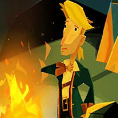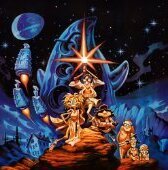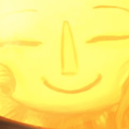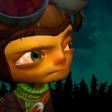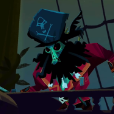Leaderboard
Popular Content
Showing content with the highest reputation on 06/26/22 in all areas
-
Distracting Monkey fans from the lack of trailers with a little animation would make me really happy. I can't wait for you all to see it, I put a ton of love into it. It's decades of my Monkey Island passion compressed into 5+ minutes.9 points
-
Turns out, guy posted two unfinished Full Throttle 2 cutscenes back in January and no one noticed 😮 Spoilers for a cancelled game Intro: Cutscene:8 points
-
4 points
-
How true. Won't go into it to keep this thread on topic and avoid the rabbit hole, but suffice it to say, the time is certainly right for more MI news to take my mind off certain developments. You better deliver, Nintendo 😂 But yes, very much looking forward to Marius' video4 points
-
Way too much bad news these days. Would really appreciate the ReMI marketing buzz to finally start spiking. Ahhh well. At least we have Marius' LCR recap tomorrow. 🥰4 points
-
Coming from a good source, a film can look spectacular at 1080p, which is proven by the many great Blu-rays that were released in the pre-4k days. Granted, through all the 200X and 201X most movies were finished at 2k resolution (which is close to the same res of 1920x1080 that we know as HD), after applying visual effects and digital color grading, and it was good enough for the cinema. The SW Special Editions and Episode 1 suffered from not-yet-great digital-to-film processes, so the quality of the VFX was even worse once transferred back to film.2 points
-
The Phantom Menace got so many VFX (or just digitally altered) shots, most of which didn't go far beyond 1080p either. Some where even created below that res (because rendering capacity was severely limited), so short of re-compositing or re-rendering all those shots at a higher resolution, that movie will never be fully 4k either. (But unlike Eps 2 and 3 most of the footage was shot on 35mm film, so in theory the live-action and model shots at least exist at higher res).2 points
-
Doesn't say "fine". Must be a rip off. 😊2 points
-
OK. I'm sorry my comment came across as a little hostile. Then again, I also care about UI/UX - and lately it's part of my day job, so it's going to be a bit futile to have a 'who cares/knows more about UX contest'. I'm sure you've been looking at it deeper and for longer, but let's just say we both vaguely know what we are talking about. I do stand by that my comment was a response to this: I don't think it was inaccurate for Laserschwert to say Full Throttle used it first - sure, it might not be your ideal version of the interface but it was the same concept, Full Throttle used it first. I disagree slightly with your later comment that If they're only superficially the same that would mean that they're fundamentally different in some way. I think they're fundamentally the same, but with some details altered. You might believe those differences make important improvements, and that's fine. I just don't think that's enough to make Laserschwert wrong. I'm not sure I feel so strongly about the tweaks, and I agree with the point Jake made about the hole in the Full Throttle one being a good touch. But if someone asks me what the first verb coin interface was I'm still gonna say Full Throttle every time (unless some other obscure game I don't know about got there first ) All that said, once again, I didn't mean for my comment to come off hostile and I'm sorry for that, but I certainly didn't see it as, as you put it, an 'unnecessary drive-by' and like you I wasn't just flapping my gums for no reason.2 points
-
Well, in the end I think we can all agree on one thing, and that’s that The Curse of Monkey Island is the best LucasArts game with the best verb interface.2 points
-
Playing around with ESRGAN a bit, I noticed how cleanly the HTR backgrounds could be upscaled, so I went the extra mile and added stuff like paper textures and brush strokes to them. The results could almost pass for scans of original background paintings (or remastered backgrounds), even though you can also see the limits of this technique on smaller details and stuff that's been meticulously pixeled in (especially text). Still, with a bit of manual work on each background, these could probably work as "Special Edition" backgrounds. A few samples (Note: These aren't aspect ratio-corrected yet):1 point
-
I have not (😞). I mean, I've seen it in the shops when I'm 12 inches away from the screen. Then it looks amazing... but am I really going to see extra detail from 3m away with a 55" screen? The science [on teh internet, admittedly] says no -- although I want to believe. (I know the HDR aspect of it is going to make a huge difference, though) A lot of the time in the cinema you're seeing "2K" a DCP package (which, as LS points out, is essentially 1080p). I've watched Blu-rays projected at the cinema and not noticed (until I saw the Bluray copyright notice after the credits to my surprise). But one day I will take the plunge on a really good 4K set and finally see for myself.1 point
-
I did like the fact that Ben and the gang decided to start wearing motorised rollerskates, though.1 point
-
1 point
-
Have you not used a 4K TV? The difference is quite obvious, although yes it tapers off over distance. You absolutely can tell the difference at, say, 55 or 65 inches, which are now fairly typical living room TV sizes. I eyeballed the difference in sharpness between the trilogies straight away the other week while doing a marathon, which as we saw above I now know the reason for.1 point
-
1 point
-
1 point
-
1 point
-
Haha. Overall despite the tampering it was a joy to see the original trilogy in 4K and HDR. Weirdly I think they look even sharper than the prequel trilogy, probably the film used or something.1 point
-
Is this citable or is it your suspicion? I only ask because this sort of stand-off is a very long-standing cinematic trope. When I watched it, it brought to mind this classic Bond scene which predates TGTBATU:1 point
-
1 point
-
Man, that scene is terrible in 4K. You can see that they seemingly replaced Harrison Ford with a CGI model and the surrounding area isn’t quite right either, for example the wall next to him has different details.1 point
-
It's like Tuco Ramirez said in The Good, The Bad, and The Ugly, in the very scene that was the model for the original SW bar shootout in the first place: "When you gotta shoot, shoot, don't talk!"1 point
-
1 point
-
The best part is in the Disney Plus version: Greedo now says "Macklunkey" for no reason before they shoot1 point
-
I think maybe the confusion here is that Thunderpeel said that COMI *perfected* "the modern verb-based interface", not that it invented it or even that it invented the 'verb coin/tattoo'. Full Throttle used the concept before COMI, but didn't use the exact same version as COMI and so this doesn't contradict the opinion that COMI perfected it. (I agree with TP that COMI's version is slicker and less fiddly, but I do still have a fondness for FT's metal af version and respect it for coming first.)1 point
-
This is actually something Bill Tiller has acknowledged borrowing from the unreleased Brian Moriarty/Bill Eaken version of The DIG, in which there was apparently an "idea inventory" for such objects (as well as more abstract concepts like the other crewmembers, for instance).1 point
-
I mean, I'd say that's pedantic to the extreme. It's the same concept. You just like Curse's implementation better... that doesn't make it a different thing.1 point
-
So what you're saying is... Disney are selling these fine leather jackets https://www.shopdisney.com/indiana-jones-leather-jacket-for-adults-2840057819027M.html?isProductSearch=0&plpPosition=21 point
-
There's also this quote from The Verge: I honestly can't imagine a point and click interface that's just as good with a mouse and keyboard as it is with a controller. But if they pull it off that'll be really cool.1 point
-
Oh, I knew exactly what I was doing, and it didn't take a voice director to guide me 🙂 I mean, cheap, fun, dumb, goofy, sleazy, whatever. Take it up with whoever wrote the line. But as an actor, there's only one way to read that line responsibly.1 point
-
I thought about making this into an article but it somehow seemed like less work better as a thread. The Lucasfilm learning division, particularly the early days of it, has always been a somewhat murky part of the company’s history. It wasn’t until the late 90s that the division emerged as the more recognized spinoff company “Lucas Learning,” which helped create the impression that it didn’t exist until then. But on Lucasfilm.com, the following entries appear in the company history timeline: The explanation for why the division was so invisible for ten years seems to be that they functioned more like an R&D laboratory than a game studio, and their main product in the early days was edutainment targeted at classrooms. They were making multimedia primarily for schools and organizations, not shelf-sold games for retail consumers. This software was of the then cutting-edge interactive CD-ROM/LaserDisc variety that anyone who grew up in the 90s was probably exposed to at some point. Most of what is publicly known about this era of the learning division comes from a series of contemporary articles that @Jenni helpfully collated here, and it comes across that the work done during this period could be pretty pioneering, experiment stuff. This video montage of Paul Parkranger and the Case of the Disappearing Ducks, a collaboration between the division and the National Audubon Society circa 1991, probably gives a decent idea of the kind of products they were developing: We know of a few recognizable LucasArts developers who served stints at the learning division. Husband-and-wife Jonathan Ackley and Casey Ackley did a spell there at the beginning of their careers. Most notably, Brian Moriarty hopped there to work on a Young Indiana Jones game between shipping Loom and his return for the ill-fated attempt at The Dig. The Young Indy game (putatively called Young Indiana Jones at the World’s Fair) was obviously a tie-in for the ABC television show, The Young Indiana Jones Chronicles, and its planned existence explains the following reference at the end of Indiana Jones and the Fate of Atlantis: Indy seems to have been a pretty big part of George Lucas’s grand plans for the division. In this article, he even claims that Young Indy was an educational software idea first, but one he concluded he would never have gotten funded in that form. So he came up with a show, which would produce hours of story content (on a television network’s dime) that his interactive concept could ultimately exploit. What’s described is pretty ambitious, ahead-of-its-time stuff: Ultimately, none of this software actually materialized, probably in part because the show got cancelled midway through its second season. In any case, the money dried up before Lucas could really take things as far as he envisioned. Young Indy still ended up being something of a hotbed for emerging technology. It is said that the series was used as sort of an incubator for some of the post-production tools that Lucas would use to make the Star Wars prequels. Digital editing, set-extending CGI effects, and other tech that would eventually become institutional in the entertainment business used Young Indy as a proving ground. When he got around to putting the series on DVD, Lucas drastically recut the show into 22 features and revisited the idea of the series as an educational tool. This included preparing 90 supplemental documentaries and approving a pretty serious initiative to produce companion curriculum. You can check out the still-functional http://www.indyintheclassroom.com/ for more. As for the learning division, it continued to exist in various forms, and was probably responsible for a few things sold under the LucasArts banner before “Lucas Learning” became a formal brand. For example, Mortimer and the Riddles of the Medallion seems like a shoo-in for a Lucas Learning title had the label existed at that time, and it would surprise me if Star Wars: Behind the Magic, an interactive encyclopedia for the franchise, wasn’t a product built in that building as well. In the developer commentary for Full Throttle Remastered, Tim asks Casey Ackley about a “library archive project” she was involved with at the learning division that he cites for its innovative use of a pop-out interface similar to Full Throttle’s. Something along the lines of Behind the Magic isn’t the craziest interpretation of what that could be referring to. It could also refer to the Indiana Jones thing. It could also refer to one of the several projects that actually got released that I simply wouldn’t know anything about. Anyway, there are still plenty of gaps, but it’s always fun to hear a bit more about this somewhat unsung arm of the Lucas empire. They were up to some wild stuff.1 point
-
Phantom Menace is probably able to be crisp, as it was shot on film, but episodes 2 and 3 were shot on very early digital video tech that maxed out at 1080p.0 points


